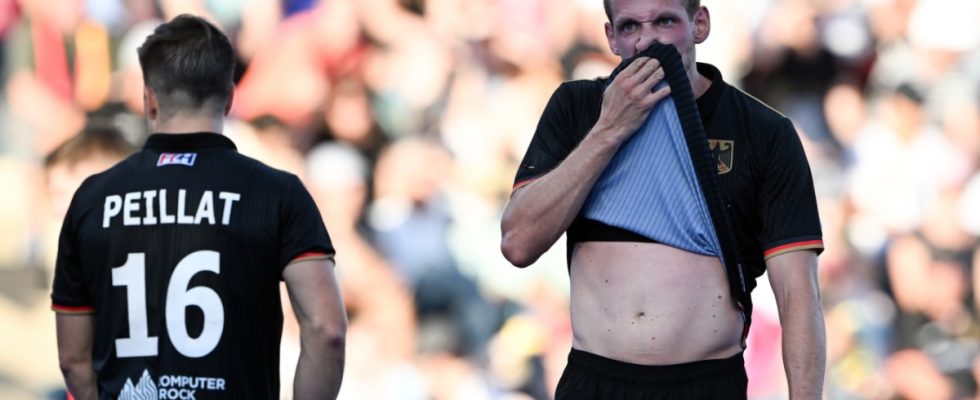Everything was prepared for a hockey festival. The grandstands in the Mönchengladbach hockey stadium were full, the sun was burning down on the watered artificial turf, and the players, especially the Germans, sprinted to their positions after the starting siren to start their home European Championship in style with their first success on Saturday evening.
They are the current world champions in this team sport. In addition, the German women’s team had already won 4-0 the night before. And despite all caution and all respect towards the opponent, it was somehow clear that an equally befitting, i.e. high victory was due here. Wales isn’t a big hockey country, it’s 15th in the international rankings, while Germany is fifth in the world rankings. So what should happen?
A final score of 3:3 then happened, and in a quite devastating way. The Welsh took a point away from André Henning’s team like a ball with a trowel in a tempo run. Those three points could have given us a reassuring lead in the table. But now the home team is already under pressure. A win must be possible in the next game, but in this game on Monday at 6 p.m. it is against one of the world powers of this sport, the Netherlands, in first place in the leaderboard. And this team had found their way into the tournament better, they overran France 6-0.
How could this develop like this? How could this draw, which was actually a defeat, happen to the team around captain Mats Grambusch, who undoubtedly played flawlessly technically and in terms of teamwork? In the first two quarters, the team had the game largely under control. She felt right about her task, and even if it was still 0-0 afterwards, she still had the better chances and the better game system. “We have mixed feelings now. Of course we are very dissatisfied that we didn’t win,” said Lukas Windfeder.
The Welsh have every reason to celebrate: Jack Pritchard (left) shortened to 1:2.
(Photo: Pro Shots/Imago)
In the next section, she had then refined her attacks. Instead of still praising high and wide balls in front, which could then rarely be picked down by their own attackers on the baseline, they began to combine more and more. And one of these clever flat passes then landed in the path of attacker Malte Hellwig, who placed the ball at full speed in the right corner of the box.
It seemed like the prelude to something similar to what the Dutch had done in the afternoon, and well, probably all the professional observers, audience and probably also the German players and their staff thought: Now nothing can burn anymore, now it’s going . Especially when it was soon 2-0 after a penalty corner that Lukas Windfeder had safely converted.
But maybe this home team lost their concentration at that moment. In any case, the Welsh were outnumbered shortly afterwards, the Germans defended a nuance more casually than before, in other words: they ran after the counterattack and could only watch how Jack Richard reduced the deficit to 1:2.
A team’s self-insecurity often grows in waves. You get back up, you feel safe, but you don’t have the necessary playful superiority. One might be surprised that this actually nominally inferior opponent is still keeping up well and even continues to counter cheekily, according to the motto: If we don’t win, we at least want to have some fun. At the end of this Saturday evening in Mönchengladbach, the Germans were insecure: they had made the 2-1 a 3-1, then Wales reduced it to 3-2, the Germans defended bravely until the ball flew sharply and precisely towards the goal and Jack Pritchard gently held his blade up again and slightly manipulated its trajectory: 3:3.
Henning’s team could no longer avert this de facto defeat, the time that was left was too short. So now the German men’s team is already in its own final. On Monday, against the Netherlands. “With seven points we can still be first in the group,” said the national coach and announced: “Our focus in the next few days will be on the defensive.” But they would have gladly done without this early tension.

